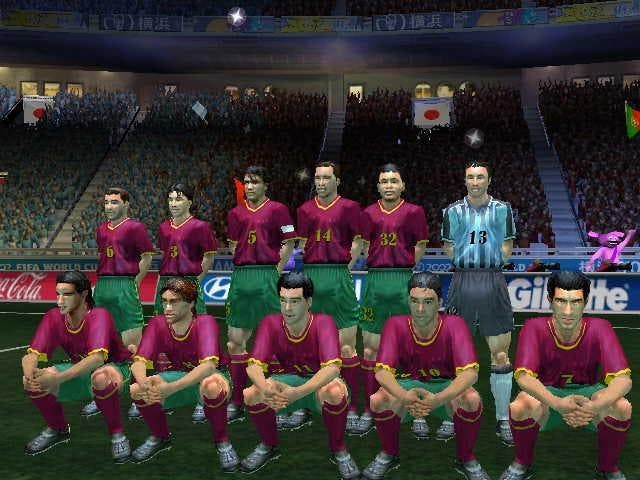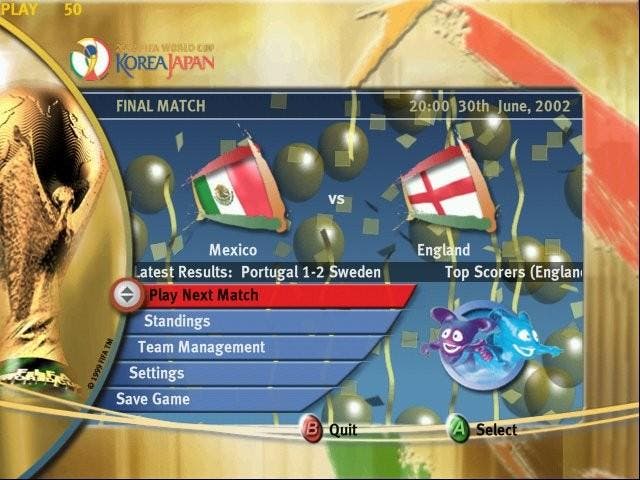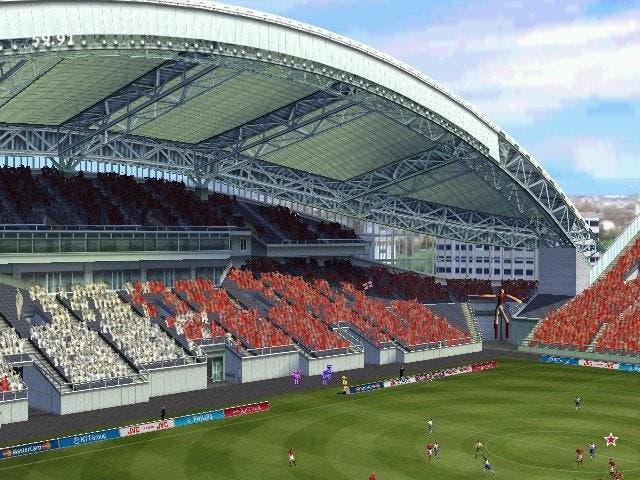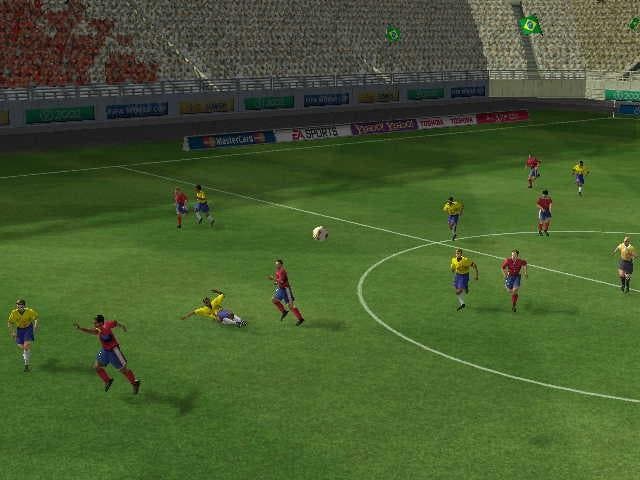2002 FIFA World Cup
Review - EA's inevitable World Cup cash-in gets a red card

New, but not improved
World Cup 98 signalled the FIFA franchise's passage from cash cow to respectable football monopoly. After a near miss with its qualifying edition, Road To The World Cup 98, the game fused accessible, addictive gameplay with - at the time - fantastic visuals. Like World Cup 98, 2002 FIFA World Cup is a deviation, but no less an integral part of the seasonal football franchise. Selling strongly on the back of tournament hype and available on every format under the rising sun, the game already looks to have capitalised on the mass hysteria surrounding the illustrious competition.
Obviously the game's distinguishing suffix is now a prefix, but the changes run a lot deeper than marketing, with major departures in the areas of graphics and gameplay. As you might expect, although the standard issue Quick Start mode and other distractions complement the spectacle, the main focus is the World Cup mode, packed with spectacular venues from Korea and Japan. Obviously at the time of publication the official squads were still only drafts, but the team data should also be largely accurate. Opting for the main event, you can choose any of the teams taking part in the tournament and even play in the correct groups, enjoying the sumptuous presentation as though the games were being played live on your TV set.
As series fans will know, EA Canada has been telling anybody who will listen about the startling changes to the formula made by FIFA World Cup, and I'm about to do the same. Unfortunately for the developer, I have a slightly different take on proceedings. To begin with, the players have received a lot of pampering, both visually and statistically. Star players - the world's best, as dictated by EA - receive increased emphasis in the departments that make them strong. For instance, David Beckham is a superb crosser of the ball, and Thierry Henry has the pace of a racehorse, while Emile Heskey merely resembles one.

Look away now
Each of the players in the game (at least those we recognise) sports an extremely detailed face and body. Michael Owen enjoys his typical inch-long short back and sides, and his nose, eyes and mouth all look fairly well proportioned. His face contorts with a number of expressions depending on his situation, perhaps best emphasized by the zooming camera work that now follows goal celebrations and shameful misses. This enhanced realism should put the game a notch above its direct competition, but like the rest of the players in the game, Owen's head is too big for his body and squashed down into his neck. Despite superb mimicry on the whole, the illusion is spoilt by this, and furthermore by the player's unblinking eyes and gaping mouth. His shirt is creased around the waist but barely moves, and although unmistakably fast he doesn't run low to the ground, stretching his legs out like the real Owen, and on the whole players lack fluidity of movement.
This is a by-product of the overuse of motion capture. Like previous games, the scene overall amounts to a jumble of poorly connected motion capture animations. While other titles in the series are just as guilty of this, it's the robotic feel applied to such realistic players which unseats FIFA World Cup. Player models are clotheshorses to abundant detail, and yet no attention has been spared for the simple transition from a despairing lunge to a light canter towards the halfway line, and it shows the whole game up. Other little problems work to highlight these flaws. Players clip through one another and even the ball at times, often as they move between set animations, and this looks especially bad during close-ups. The ball actually slides back onto the feet of pass and shot making players - again, accentuated by close camerawork - and despite most of the players casting a shadow from each floodlight, the ball is apparently transparent.
Further visual touches do little to rescue the blemished aesthetic. Highlighting the arcade nature of the game, EA Canada has supplemented the imagined visuals with coloured spots on the pitch to track moving players, while adding a pronounced motion blur to fast players and a fiery effect to speeding shots, complete with sound effect. I didn't find these useful however, and they can't be turned off. Tut tut.

Shortcomings continued
As you might expect, the tarnished visuals do little for the gameplay, but the changes made by EA Canada fight to bring the whole thing down by themselves. Every kick, from passes and goal kicks to shots and crosses, now relies on the staple power bar, which charges up as you hold down the relevant button.
Because of this forced delay between input and reaction, the game loses its immediacy, and even on its sternest setting the liberal refereeing often leads to quick turnover up and down the field. This in turn creates the false impression in the player's mind of a sluggish control system, perpetuated by unfeasible slowdown in animation as players congregate on the ball and play it between them. One-touch football is almost completely absent, and you will find none of the depth of the simulation-focused Pro Evolution Soccer. To add insult to the injury of PlayStation 2 owners who might purchase FIFA World Cup, their version of the game suffers from even more slowdown than the Xbox and GameCube versions, which in turn occasionally strain the hardware on replays and close-ups.
Those PlayStation-less gamers among you may find solace in FIFA World Cup's 'lite' simulation features, but these too are limited. Fatigue accumulates during a game, rendering over-used players (usually down the right flank) completely useless midway through the second half, and although passing, lobbing, through balls and one-twos are options for those seeking greater depth, the poorly realised power bar interferes with a potentially enjoyable dynamic. Shots can't be directed as accurately as in the likes of Pro Evo, and World Cup offers none of the little dinks and cunning technique of that game, while tackling is simplistic and often brutally inefficient. Seasoned players should have no trouble tracing a line to the goal through an easily fooled defence.

Maybe next time...
For all its shortcomings though, there is no game closer to the televisual experience of the World Cup than 2002 FIFA World Cup. To magnify this, EA's commentary team is eminently respectable, comprising people's favourite John Motson and Scottish loudmouth Andy Gray. The pairing might not work particularly well in real life, but they do work surprisingly well here. Motto has an enormous array of metaphors and expressions which he puts to use throughout the game, and the commentators' respective analysis is mapped superbly to the events on the pitch. Intro and exit comments are almost insightful, and Man of the Match awards are presented, although disappointingly this is usually a goal scorer's distinction.
Returning to the downward spiral though, gone are the rousing pop and rock melodies of Robbie Williams and co., replaced by BBC Sport style classical themes, unfortunately executed with none of the pizzazz and none of the notoriety of the channel's themes. Even the game's sound effects fall short of the standards set by their predecessors; slide tackles sound like someone kicking up gravel, and players grunt and moan far too audibly to be realistic.
It's hard not to take a negative tone with this game, and I'm sure by now the conclusion (and pun) must be obvious, but I'll say it anyway: EA has dropped the ball with its latest release. Let's hope this poor showing doesn't return the series to its position of outright inferiority. Lacking the depth of its major rival, saturated with problems and bloated with unnecessary detail which actually works against the developer, this FIFA is a blotch in the copybook of an otherwise competent arcade football series. Not even sterling presentation and John Motson can rescue the party, and ultimately this deeply average incarnation of FIFA may not sell as well next time unless something is done to rectify the situation.

